The King’s Speech Essay (Movie Review)
The film, The King’s Speech (Hooper) is a story filled with intricate anti-stereotypic images and paradigm shifts within a larger plot of the British royal family. It is set in the period when Britain went to war with Germany. Albert, the Duke of York, who will later inherit the throne as King George VI, has a speech defect. He stammers and has fruitlessly visited every known professional speech therapist.
To make matters worse, his rise to the throne demands that he makes public speeches which will be broadcast all over the British Empire and its many colonies. Albert’s wife, Elizabeth, visits a quite unorthodox speech therapist in an attempt to help her husband. Lionel Logue is a failed actor who is also an expert in speech therapy using various psychoanalysis methods.
The film revolves around the professional relationship between Logue and his patient, Albert. The professionalism, however, is short-lived as a close friendship develops between the two men. Unlike Albert’s previous doctors and therapists, Logue’s methods are quite unorthodox. He doesn’t regard Albert’s speech impediment as a medical problem that can be solved by legalistic procedures and breath exercises.
Instead, he views the problem as being much deeper than a mechanical speech impediment. In the patient-therapist interactions, Albert is forced to open up about his life, his childhood and his fears. At first, Logue’s methods seem quite irrelevant to the problem at hand. However, in overcoming his internal fears, Albert is slowly able to overcome some of his speech impediments, albeit with a lot of effort.
The movie presents many counter-stereotypical images in this relationship between a failed actor from Australia and the King of England. Albert inherits the throne after his elder brother, Edward, who gives it up so that he can marry the woman he loves. It is ironical how Lionel Logue seems to have all the tricks to help the King overcome his fears and present a flawless speech. On the other hand, Logue’s many failed attempts in acting auditions seem paradoxical to his theatrical approaches in his healing methods.
Logue, a common man who is expected to be fearful, submissive and non-opinionated before his majesty, displays the exact opposite of these attributes. On the other hand, Albert, who is a king and is supposed to exude confidence, charisma and a sense of authority, is the one who comes out as timid, fearful, with low self-esteem and an inability to explore his own individuality.
Such counter-stereotypical images and scene characterize the whole plot of the movie. These features thus make the movie a timeless creation for presenting social issues. Although set in a particular political period, the historical context is not as important as the social values lessons being expressed.
In conclusion, The King’s Speech is an excellent movie that goes against the common trends of most movies. Instead of being the typical game-changing film, it is more of a game-keeping movie. This is because it brings to light issues that people deal and struggle with, but never really get to air. The film is excellently produced and cleverly delivered to drive its various points home.

Works Cited
Hooper, Tom. The King’s Speech . London: The Weinstein Company, 2010. Film
- Chicago (A-D)
- Chicago (N-B)
IvyPanda. (2018, October 19). The King’s Speech. https://ivypanda.com/essays/the-kings-speech-movie-review/
"The King’s Speech." IvyPanda , 19 Oct. 2018, ivypanda.com/essays/the-kings-speech-movie-review/.
IvyPanda . (2018) 'The King’s Speech'. 19 October.
IvyPanda . 2018. "The King’s Speech." October 19, 2018. https://ivypanda.com/essays/the-kings-speech-movie-review/.
1. IvyPanda . "The King’s Speech." October 19, 2018. https://ivypanda.com/essays/the-kings-speech-movie-review/.
Bibliography
IvyPanda . "The King’s Speech." October 19, 2018. https://ivypanda.com/essays/the-kings-speech-movie-review/.
- Thelonious Monk - Unorthodox Pianist
- Behavior & Labeling Theory: Lionel Tate Case
- Herbert Lionel Adolphus Hart's Philosophy
- Human Rights in the Movie Escape From Sobibor
- Dogtooth: Greek Understanding of Horror Films as a Separate Genre
- Religion and Cinematography
- White Zombie and The Thing on the Doorstep
- Reviewing the Aesthetic Sense of Korean Cinema Through a Western Canvass
Sydney's RCL Blog
Just another weblog, the king’s speech: a rhetorical analysis.
Anyone that has seen the 2010 film The King’s Speech knows of the numerous circumstances preceding King George VI’s delivery of his first wartime broadcast. Above all, they know of his personal anxiety surrounding his usurping of the throne and speech impediment; however, this sample of historical rhetoric goes beyond a simple Colin Firth film. On September 3, 1939, King George VI of the United Kingdom gave an address to the nation, explaining that they were once more at war and why they stood in such a state. In making use of argumentation, addressing his audience appropriately, and handling his speech defect efficiently in delivery, King George VI calls on the ethos, pathos, and logos of his subjects, effectively presenting his arguments for going to war with Germany.
In calling on logos, pathos, and ethos, King George VI effectively presents a strong argumentation in favor of going to war. In presenting these arguments, he embraces the theme of calling on his subjects’ sense of duty—whether it have a basis in political, religious, or civic motivation. In the national address, King George VI reminds the people that more diplomatic actions have been attempted, but have failed against their new enemies. To present this argument in favor of direct action, he pronounces, “over and over again we have tried to find a peaceful way out of the differences between ourselves and those who are now our enemies. But it has been in vain. We have been forced into a conflict.” By pointing out these past engagements in a factual manner, King George VI appeals to the people’s logos. If his subjects can see the reasoning behind his actions, they will feel more inclined to support the war effort and put him in their favor. It is important to note that many people doubted King George VI in the start of his reign, so he needed this speech to succeed to win them over. He did so by exemplifying the compassionate leader during a somber time in trying to connect with his audience. A second argument King George makes exists in his statement of the crimes their enemies have committed which prompted the action he has taken. “It is the principle which permits a state, in the selfish pursuit of power, to disregard its treaties and its solemn pledges; which sanctions the use of force, or threat of force, against the sovereignty and independence of other states,” he says clearly to express his point. In one sentence, King George VI references Germany’s massive rise to power and negligence towards the Treaty of Versailles—the document that ended the First World War. The British king appeals to the people’s logos by explaining these numerous wrongdoings committed by Germany, affirming that action must be taken swiftly. This too appeals to ethos in that, as moral citizens of the global community, the British must feel compelled to help their fellow man. Due to the fact that he could appeal to ethos, pathos, and logos in his many arguments for the war effort, King George VI greatly succeeds in increasing support for the cause and himself.
From the very start of his address, King George VI identifies his audience and his relationship with them, building a sense of trust and mutual duty. To call on their ethos and pathos, King George also tries to establish a personal connection for the effort of unity for the upcoming war effort to the entirety of his subjects. He calls for all citizens to act with their personal, physical, and emotional strength, showing his faith in the abilities of the British. The address calls them to remember the last World War that they fought valiantly in by stating “or the second time in the lives of most of us we are at war.” This also reiterates in the people’s minds that King George VI fought in the first world war himself; this appeals to their ethos in that it offers the king credibility in making important wartime decisions. King George VI goes on to appeal to their pathos, or emotional mindset, by affirming the British citizens’ religious consciousness. He also appeals to from a place of pathos-appeal because, as king, he acts as the head of the Church of England. At the close of his speech, King George VI declares, “But we can only do the right as we see the right, and reverently commit our cause to God. If one and all we keep resolutely faithful to it, ready for whatever service or sacrifice it may demand, then, with God’s help, we shall prevail.” In mentioning their religious nature, he petitions the people’s faith and sense of civic and moral duty to their fellow man. By characterizing his subjects, King George VI effectively appeals to their various natures of emotion, trust, and logic.
A major problem facing King George VI during his reign rests in his public image largely which became tarnished by his poor public speaking skills; therefore, when he gave this address to the public, many were in shock and won over by his eloquence. A major point rests in the fact that he did not completely shed himself of his stammer; he merely learned to work around it. This speech had the purpose of reassurance and motivation. Its delivery required a slow, somber tone that fits directly into King George’s way of speaking without a restricting stutter. This purposeful and deliberate presentation causes the matter at hand to seem all the more serious. So indirectly, King George’s need to speak slowly further emphasizes his points in his very first wartime address. This delivery calls upon their pathos in that it made them feel the tension and solemnity of the era that they were entering. Due to the perceived severity, the British people were compelled to listen closer and respond even more strongly for the entire five minutes and forty-five seconds. Furthermore, prior to this speech, the British public viewed King George VI as less than satisfactory in comparison to his predecessors—his brother, King Edward VIII, and his father, King George V. Both of his relatives had been noted for their strong speaking skills and use of the radio, a relatively new commodity for the average person. The fact that this address to the United Kingdom exists as one of the first wartime broadcasts in history appealed to the ethos of many because it contradicted the popular perception at the time. On the grounds that that he had a heavy stammer and had never used the newer technologies, many believed he would prove an incompetent ruler. King George VI managed to win over the nation with the help of necessary slow speaking and the use of the radio.
King George VI fought his entire life to overcome a debilitating speech impediment, something he never quite achieved, but managed to control to the point of winning over the majority of the nation in one speech. Not only did he make his stammer work for his benefit with the need for a slow delivery, but he also backed himself up with strong argumentation and with an assured knowledge of his audience. In this concise address to his people, King George appealed to ethos, pathos, and logos multiple times and gained support for the war effort from the beginning. This four hundred and seven word speech inspired a nation to take action. It even inspired a blockbuster film.
Works Cited
King George VI. “King George VI Addresses the Nation.” Speech. Buckingham Palace,
London, England. 3 Sept. 1939. The King’s Speech: Royal Broadcasts in the BBC
Archives . BBC News, 17 Dec. 2010. Web. 5 Oct. 2013.
<http://www.bbc.co.uk/news/entertainment-arts-12020794>.
King George VI. “The Real King’s Speech.” YouTube . YouTube, 05 Feb. 2011. Web. 05
Oct. 2013. <http://www.youtube.com/watch?v=opkMyKGx7TQ>.
The King’s Speech . Dir. Tom Hooper. Perf. Colin Firth and Geoffrey Rush. Paramount,
2010. Film.
Leave a Reply
You must be logged in to post a comment.
- Recent changes
- Random page
- View source
- What links here
- Related changes
- Special pages
- Printable version
- Permanent link
- Page information
- Create account
How historically accurate is the movie The King's Speech
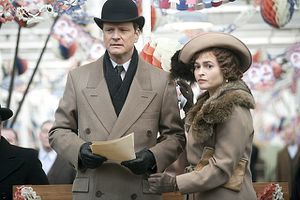
In 2010, The King’s Speech won the Oscar for Best Picture and grossed over $414 million worldwide. It was an unlikely box office champion because it was based on a true story about King George VI of Britain (1895-1952) and an Australian speech therapist Lionel Logue (1880-1953). It shows how Logue helped the king overcome a crippling stammer and how this helped him lead his country during World War II. The movie was directed by Tom Hooper and written by David Seidler.
Critics have widely praised the editing, cinematography, directing, and acting. The movie was able to express the main characters' inner life by the clever use of lighting and other cinematic techniques. Colin Firth won an Oscar for his portrayal of George IV/ The King’s Speech was produced by a British company, and it was shot mainly in London. Among the supporting cast was Helen Bonham-Carter, who played Queen Elizabeth, the wife of the king. The movie was nominated for 12 academy awards, and it won four awards, including one for Best Picture.
Before the movie began filming, the writer, Seidler, found Logue's journal and incorporated elements from the journal into the movie. However, despite this, the historical accuracy of the movie has been questioned and even widely criticized.
When does the King's Speech take place?
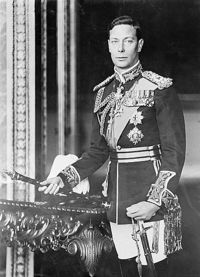
The King's Speech takes place mainly in the 1930s at a critical juncture for Britain and its Empire. The nation and its various dependencies had still not recovered from the ravages of World War or the Great Depression. Internationally, Hitler was in power in Germany, and many feared, correctly, that there would be another World War. [1] The rather bleak mood of the time is captured very well by the director. At this critical point in its history, the British Royal Family faced its crisis.
After George V's death, he was succeeded by his eldest son, who became Edward VII in 1936. Edward VII's reign was both brief and controversial. Edward wanted to marry a divorced American, Wallis Simpson. Marrying a divorced was unacceptable to many in Britain at this time as the King was also head of the Church of England. Divorce was socially unacceptable, and the Anglican Bishops and others denounced the idea of the monarch marrying a divorced woman.
When Edward VII decided to marry Wallis Simpson, he was forced to abdicate his crown soon after his Coronation. This meant that his younger brother George or Bertie, as he was known, became king. [2] The depiction of these events in the movie has been fictionalized but is reasonably accurate.
However, there were some inaccuracies in the movie that troubled viewers. One of the scenes that caused the most controversy was when Sir Winston Churchill, the future leader of war-time Britain, supported the accession of George V. This scene misrepresented Churchill's view of Edward's abdication entirely. Churchill supported Edward VII (1894-1972) and believed that he should remain as king despite his marriage to Wallis Simpson. He was friendly with the abdicated king and remained a supporter. [3]
Unlike in the movie, Churchill did have grave doubts about the ability of George VI to carry out his Royal duties. He was not alone in the belief, and many others shared that view in the highest circles of the British government. Over time, he did come to accept the younger brother of Edward VII and came to respect him as an able monarch and leader . [4]
The King and his Stutter
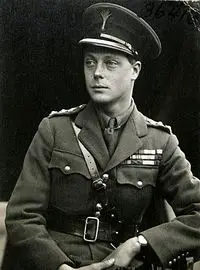
The movie's central theme is the difficulties faced by George VI because of his stutter and how Logue was able to help him overcome his speech defect. This depiction is historically accurate, and the future George VI had a serious speech impediment. In the movie, Firth's character is shown as having a terrible stammer and that when he became nervous or anxious, he was almost unable to communicate. His stammer made public speaking almost impossible for the monarch.
The movie shows that his speech impediment was a result of his insecurity and shyness. [5] This was very much the case, and George VI did have a terrible stutter from childhood. The King’s Speech accurately shows the real problems caused by the future George VI and the entire Royal Family. In one scene at the opening of an exhibition celebrating the British Empire, George struggles with a speech and becomes visibly upset. The movie shows many senior officials and members of the Royal Family becoming gravely concerned about this. In the 1930a, when the movie is set, for the first-time, Royalty members were expected to speak in public and be effective communicators because of the growing importance of the mass media. [6]
The inability of George VI to publicly speak clearly was a real problem, and it was feared that it could damage the Royal Family and even undermine confidence in the government of the British Empire. The movie does somewhat exaggerate the importance of the king’s stutter, but it was a significant issue for the Royal Family.
When did Lionel Logue begin treating George VI?
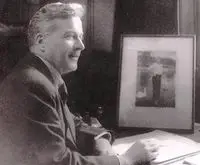
Perhaps the biggest inaccuracy in the movie is that Logue was, in reality, able to help the King to overcome his stammer before the abdication crisis and his coronation rather than after these events. He first began to treat the second son of George V in the 1920s and continued to do so for many years. The movie shows that the treatment took place in the 1930s, and this was no doubt done for dramatic effect, but this is not strictly correct.
Cooper’s movie relates how George had been seeking help all his life for his stammer, and he tried every technique and treatment available for the time, which is true. The 2010 motion picture does really capture the sense of desperation and anxiety that the future George VI had over his speech impediment. He is shown as going in desperation to the Australian Logue, and this is also correct. The therapist is shown as using innovative techniques to help George overcome his stammer, which is right. The Australian was an early pioneer in speech and language therapy, and he was an innovator. [7] The film shows Rush trying to instill more confidence in the Royal. He adopts several strategies, but none are shown to work.
How did Logue treat George VI's speech impediment?
Eventually, he provokes the king, and in his anger, he can speak stutter-free. In reality, the speech and language therapist gave the monarch a series of daily vocal exercises, such as tongue twisters, that were designed to help him to relax. This helped the future king to relax, and this was key to the improvements in his speech. The motion picture does show that the treatment was not a total success, and the king continued to have a very slight stammer. This was indeed the case. However, the improvement in the speech of George VI was remarkable, which is accurately shown in the 2010 movie. It shows George having grave doubts about Logue and his treatment when he hears that he is not formally qualified as a therapist.
In real life, this did not cause a crisis in the relationship between the British sovereign and the Australian therapist. It is correct that Logue was not formally qualified because there was no education system for language therapy when he was young. Instead, he was self-taught and had traveled the world, studying the ideas of respected speech therapists. The movie leaves the viewers in no doubt that the king and the Royal Family owed the Australian a great debt, and this was the case, and when George VI died, his widow, the Queen, wrote to the therapist to thank him for all he had done for her husband. [8]
What was the relationship between King George VI and Lionel Logue?

The movie shows that the two men began to become real friends over time, despite their differences. This was the case, and it appears that both men liked each other and even enjoyed each other’s company. The relationship between the British king and the Australian is very realistically shown, and they remained friends until the early death of George VI. The movie shows that Logue was present when George made important Radio broadcasts to the British Public. This was the case, but Logue continued to coach the king to speak in public for many years.
In the movie, Logue is shown when George VI pronounced that Britain was at war with Germany in September 1939 during a radio address to the nation. This is not correct, but the Australian did provide the king with notes on things where he should pause and breathe, and these were a real help in the most important speech the monarch ever made. Logue continued to coach the king for many years until about 1944.
The therapist is shown as being very much at ease in the King's presence and treating him like any other client. This was not the case. Despite their genuine friendship, Logue would have been expected to have been somewhat formal and respect the Royal Person of the King at all times. In real life, Logue was not as easy-going and familiar with George VI as portrayed in the historical drama. [9]
Was George VI accurately portrayed in the King's Speech?
Colin Firth’s performance was widely praised. The British actor won the Academy Award for Best Actor. While Firth's performance was widely acclaimed, there were some concerns about how accurately he portrayed the monarch. In the main, Firth did manage to capture George VI and his character in the feature film. The British actor did correctly show that the monarch was a timid and insecure man who felt that he was not equal to his Royal duties, and this was something that greatly distressed him. [10]
His stammer may have been a result of his sense of inadequacy, but this cannot be known, for certain. Firth does show that the monarch did grow in stature after he was crowned as King. It leaves the viewer in no doubt that by the end of the movie, Firth, who has largely overcome his stammer, could lead his country in its hour of greatest danger. [11]
This was the case, and the monarch became widely respected for his leadership and his calm dignity. However, the script tended to be overly sympathetic to George and avoided his character's rather unpleasant aspects. He was alleged to have both fits of anger and alleged acts of domestic violence. Those allegations have not been confirmed.
Helena Bonham Carter's performance was praised, and she does capture the personality of Queen Elizabeth (1900-2002). She was a very supportive wife and dedicated to her husband. She did not want him to become king because she feared what it would do to him. Her family, as shown in the feature film. [12] Geoffrey Rush played the character of the speech and language therapist Logue, and he presented him as a larger-than-life figure who was charismatic, and this was indeed the case. It is generally agreed that Rush really captured the personality of the acclaimed speech and language therapist.
How realistic is the King's Speech?
Overall, the movie is historically accurate. It shows the modern viewer the importance of the King's treatment for his speech impediment. This movie also captures the real sense of anxiety in Britain in the 1930s, and it broadly captures the historical context of the Coronation of George VI. The relationship between Logue and the monarch is also largely accurate. However, this is a movie, and the need to entertain means some inaccuracies, especially concerning details such as the king's treatment. However, when compared to other historical dramas, the movie is very realistic.
Further Reading
Bowen, C. (2002). Lionel Logue: Pioneer speech therapist 1880-1953. Retrieved from http://www.speech-language-therapy.com/index.php?option=com_content&view=article&id=53
Bradford, Sara. King George VI (London, Weidenfeld, and Nicolson, 1989).
Ziegler, Philip, King Edward VIII: The Official Biography ( London, Collins, 1990).
- ↑ Thorpe, A. Britain in the 1930s (London, Blackwell 1992), p 115
- ↑ Thorpe, p 118
- ↑ Rhodes James, Robert A spirit undaunted: The Political Role of George VI (London: Little, Brown & Co, 1998), p 118
- ↑ Logue, Mark; Conradi, Peter, The King's Speech: How One Man Saved the British Monarchy (New York: Sterling, 2010), p 13
- ↑ Logue, p 134
- ↑ Thorpe, p. 289
- ↑ Logue, p 145
- ↑ Logue, p 115
- ↑ Logue, p. 167
- ↑ Logue, p 189
- ↑ Logue, p 192
- ↑ Rhodes, p 201
- Historically Accurate
- World War Two History
- British History
- This page was last edited on 15 September 2021, at 05:21.
- Privacy policy
- About DailyHistory.org
- Disclaimers
- Mobile view

- Issue Archive
- Stay Connected
Review: The King's Speech
By Scott Foundas in the November-December 2010 Issue
“In the past, all a king had to do was look good in uniform,” observes King George V (Michael Gambon)—the first British monarch to address his subjects via radio—early on in Tom Hooper’s splendid period drama The King’s Speech . “Now we must invade people’s homes and ingratiate ourselves,” he continues. “We’ve become actors!” And this was 1934, three decades before the landmark BBC television documentary Royal Family brought the House of Windsor even closer to the people, and five before Lady Diana Spencer irrevocably blurred the line between commoner and royal, princess and pop icon. George V’s comments are directed at his youngest son, Albert Frederick Arthur George (Colin Firth), who will soon be thrust upon the throne just as England readies to enter World War II. But unlike his sober, stentorian-voiced father, the eventual George VI (father of Queen Elizabeth II) is hopelessly tongue-tied when it comes to public speaking, the victim of an acute stammer that turns ordinary conversation into a humiliating succession of false starts and too-long pauses.
If The King’s Speech risks being too cute by half in its depiction of how this royal without a voice comes to find one in his nation’s hour of need, Hooper and screenwriter David Seidler neatly avoid that trap by training their sights on a much bigger subject—namely, how the wireless waves of radio affected seismic changes to the nature of politics and society at large, turning public figures into performers, and narrowing the distance between classes. Yet amidst all the ballyhoo about Hooper’s film as The Social Network ’s chief rival for Oscar gold, few if any have noted the extent to which the two movies orbit a similar central theme—two portraits of a communications revolution, separated by a century.
We first see the king-to-be (then Duke of York) freezing at the mic during his closing speech of the 1925 Empire Exhibition at Wembley. After being subjected to a succession of useless therapies by a series of royal quacks, the Duke takes a grudging chance on one Lionel Logue (Geoffrey Rush), an Australian-born amateur actor and self-taught speech therapist with no credentials other than his own track record. What follows suggests a role-reversal My Fair Lady , with the lowly Antipodean coaching the aristocrat through measures (rolling around on the ground, shouting streams of obscenities) that have more in common with radical psychotherapy than conventional speech pathology.
Conducting the sessions in a draughty basement room with unfinished walls, Logue adds insult to injury by asking His Royal Highness leading questions about his childhood—an inventory of other forcibly corrected “defects,” including left-handedness and knock knees—and calling him by his family nickname, “Bertie.” (He insists that, in order for the treatment to work, the two men must regard each other as equals.) Their back-and-forth repartee, courtesy of Seidler (a septuagenarian Hollywood vet whose most notable prior credit was on Francis Coppola’s Tucker: The Man and His Dream ), is as sharp as anything this side of Aaron Sorkin. Even sharper, arguably, is the film’s sense of the high value placed on normalcy in a society with little tolerance for disability and aberration.
These are the sort of plum roles that can all too easily turn into smoked ham, but Firth and Rush manage them with an ideal balance of flourish and restraint. Hooper, who has become something of a specialist in exhuming British history from the mothballs of Masterpiece Theatre —his credits include Elizabeth I (05) and the masterful Longford (06), as well as The Damned United (09)—does so again, shooting in long takes and exaggerated wide angles that amplify Bertie’s mounting sense of uncertainty as he finds the weight of the world—and so many words—upon his shoulders.
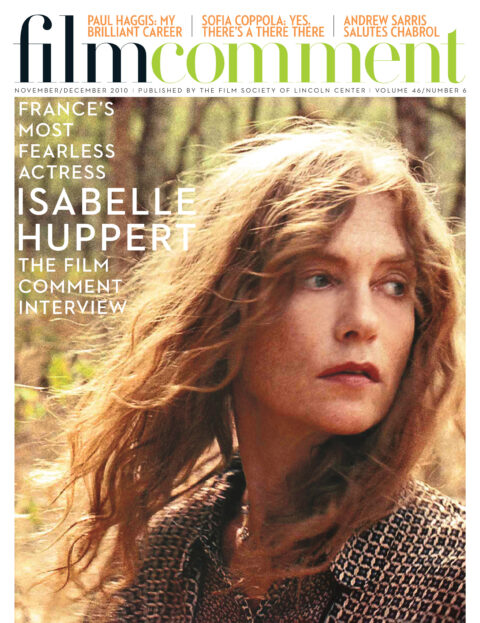
Making Sense of Life: Open City Documentary Festival 2024

Heaven Can Wait

Film Comment Recommends: Coconut Head Generation

Conceived in Liberty

Sign up for the Film Comment Letter!
Thoughtful, original film criticism delivered straight to your inbox each week. Enter your email address below to subscribe.

Pioneering the Future of AI-Enhanced Storytelling
The King's Speech
A tale of friendship, transformation, and royalty's quest for equality
An uplifting and warm-hearted character study that owes as much of its delight to a charming performance by Geoffrey Rush as it does to a structure built upon depicting a Change Main Character who grows out of seemingly insurmountable odds ( Stop/Good ) to overcome his personal issues. Appearances are at the heart of issues within The King’s Speech , and the Duke of York (Colin Firth as Protagonist ) does his best to keep up the show by being the King his subjects so desperately need ([Story Goal of Being ). Bertie’s change develops as a consequence of his relationship with Lionel Logue (Geoffrey Rush), a speech therapist from the other side of the tracks who demands the two be treated as equals ( Obstacle Character Domain of Universe ). This unique perspective works wonders on the Duke’s personal issues of feeling less-than-equal in matters of royalty ( Main Character Domain of Mind ). Together, the two develop an unlikely friendship as they work to overcome Bertie's speech impediment ( Relationship Story Domain of Physics & Relationship Story Problem of Test ).
Decisions both bad and good (bad on the part of the Duke’s brother David (Guy Pearce) and good on the part of our Hero to continue services with Lionel) propel this film to its Triumphant ending ( Story Driver of Decision , and Story Outcome of Success ). While not overly complex, the film delivers a meaningful example of what can happen when one brings themselves into alignment ([Main Character Solution of Deviation by focusing on doing, rather than worrying endlessly upon the end results ( Obstacle Character Problem of Process ).
Oh, and a brilliant use of Beethoven’s 7th Symphony.
Download the FREE e-book Never Trust a Hero
Don't miss out on the latest in narrative theory and storytelling with artificial intelligence. Subscribe to the Narrative First newsletter below and receive a link to download the 20-page e-book, Never Trust a Hero .
Helping Writers Become Authors
Write your best story. Change your life. Astound the world.
- Start Here!
- Story Structure Database
- Outlining Your Novel
- Story Structure
- Character Arcs
- Archetypal Characters
- Scene Structure
- Common Writing Mistakes
- Storytelling According to Marvel
- K.M. Weiland Site
The King’s Speech
Inciting Event: Watching Bertie, the Duke of York, go through another ineffective and humiliating “treatment” for his stammer with another respected doctor. Bertie’s wife Elizabeth gets the name of Lionel Logue, a speech therapist, and visits him to see if he can help her husband.
First Plot Point: After a disastrous first meeting with Lionel Logue, and another stressful and humiliating meeting with his father, King George V, whom everyone loves, Bertie listens to a recording Lionel made of him (Bertie) reading Hamlet perfectly, with no stammering. Bertie realizes it’s possible. He can’t not try.
First Pinch Point: Even before the death of their father the king, it’s apparent Bertie’s older brother David, the Prince of Wales, is going to make a very unsuitable king. After David is crowned King Edward VI, Lionel suggests Bertie would be a much better king. This is basically treason and Bertie says so, but Lionel pushes his point. He and Bertie argue, and Bertie breaks off their sessions.
Midpoint: David abdicates and the thing Bertie has been dreading happens: He must become king, which means not just speaking in public, but being an inspiring leader, something he never dreamed he was capable of doing. But now he must.
Second Pinch Point: Bertie calls in Lionel to help him get through the coronation. During the rehearsal, Bertie is informed Lionel is not an actual doctor. He’s embarrassed for training with someone who isn’t “qualified.”
Third Plot Point: Lionel explains how he got into speech therapy and in the process shows Bertie that results are more important than “letters behind a name.” Bertie now has full confidence in Lionel, to the point that now he’s standing up to the people who had always intimidated him to defend Lionel. He’s embracing the role of king.
Climax: With guidance from Lionel, Bertie gives the speech of his life, explaining to the country why they are going to war again so soon after the horrible experience of the Great War. This speech will define him as a king capable of leading his nation through its worst crisis. By the end of the speech, he believes it himself.
Climactic Moment: After the speech, Bertie thanks Lionel, calling him “Lionel” for the first time, instead of “Dr. Logue.” For the first time, instead of calling him “Bertie,” Lionel calls him “Your Majesty.”
Resolution: It’s very quick. Bertie goes out on the balcony with his family and we can see now that he’s fully embraced the role and responsibility of being king.
Notes: Besides being well structured, this movie is a great example of how to introduce the tension right away, then keep raising it gradually by constantly upping the stakes through the course of the story. At the beginning of the movie, Bertie–and the viewers–don’t know that by the end he’ll be looking at the same goal, of successfully making a speech, but by then the stakes will be so much higher.
(Submitted by Marnie Werner.)
Sign Up Today

Story Structure Database Index
Click here for a complete alphabetical list of all titles in the Story Structure Database.
SELECT GENRE

(Amazon affiliate link)

Subscribe to Story Structure Database Updates

Return to top of page
Copyright © 2016 · Helping Writers Become Authors · Built by Varick Design
Movie Reviews
Tv/streaming, collections, great movies, chaz's journal, contributors, the rain in sp…sp...sp....

Now streaming on:
"The King's Speech" tells the story of a man compelled to speak to the world with a stammer. It must be painful enough for one who stammers to speak to another person. To face a radio microphone and know the British Empire is listening must be terrifying. At the time of the speech mentioned in this title, a quarter of the Earth's population was in the Empire, and of course much of North America, Europe, Africa and Asia would be listening — and with particular attention, Germany.
The king was George VI. The year was 1939. Britain was entering into war with Germany. His listeners required firmness, clarity and resolve, not stammers punctuated with tortured silences. This was a man who never wanted to be king. After the death of his father, the throne was to pass to his brother Edward. But Edward renounced the throne "in order to marry the woman I love," and the duty fell to Prince Albert, who had struggled with his speech from an early age.
In "The King's Speech," director Tom Hooper opens on Albert ( Colin Firth ), attempting to open the British Empire Exhibition in 1925. Before a crowded arena and a radio audience, he seizes up in agony in efforts to make the words come out right. His father, George V ( Michael Gambon ), has always considered "Bertie" superior to Edward ( Guy Pearce ), but mourns the introduction of radio and newsreels, which require a monarch to be seen and heard on public occasions.
At that 1925 speech, we see Bertie's wife, Elizabeth (Helena Bonham Carter), her face filled with sympathy. As it becomes clear that Edward's obsession with Wallis Simpson (Eve Best) is incurable, she realizes her Bertie may face more public humiliation. He sees various speech therapists, one of whom tries the old marbles-in-the-mouth routine first recommended by Demosthenes. Nothing works, and then she seeks out a failed Australian actor named Lionel Logue ( Geoffrey Rush ), who has set up a speech therapy practice.
Logue doesn't realize at first who is consulting him. And one of the subjects of the film is Logue's attitude toward royalty, which I suspect is not untypical of Australians; he suggests to Albert that they get on a first-name basis. Albert has been raised within the bell jar of the monarchy and objects to such treatment, not because he has an elevated opinion of himself but because, well, it just isn't done. But Logue realizes that if he is to become the king's therapist, he must first become his friend.
If the British monarchy is good for nothing else, it's superb at producing the subjects of films. "The King's Speech," rich in period detail and meticulous class distinctions, largely sidesteps the story that loomed over this whole period, Edward's startling decision to give up the crown to marry a woman who was already divorced three times. Indeed, the Duke and Duchess of Windsor (as they became) would occupy an inexplicable volume of attention for years, considering they had no significance after the Duke's abdication. The unsavory thing is that Wallis Simpson considered herself worthy of such a sacrifice from the man she allegedly loved. This film finds a more interesting story about better people; Americans, who aren't always expert on British royalty, may not necessarily realize that Albert and wife Elizabeth were the parents of Queen Elizabeth II. God knows what Edward might have fathered.
Director Tom Hooper makes an interesting decision with his sets and visuals. The movie is largely shot in interiors, and most of those spaces are long and narrow. That's unusual in historical dramas, which emphasize sweep and majesty and so on. Here we have long corridors, a deep and narrow master control room for the BBC, rooms that seem peculiarly oblong. I suspect he may be evoking the narrow, constricting walls of Albert's throat as he struggles to get words out.
The film largely involves the actors Colin Firth, formal and decent, and Geoffrey Rush, large and expansive, in psychological struggle. Helena Bonham Carter, who can be merciless (as in the "Harry Potter" films), is here filled with mercy, tact and love for her husband; this is the woman who became the much-loved Queen Mother of our lifetimes, dying in 2002 at 101. As the men have a struggle of wills, she tries to smooth things (and raise her girls Elizabeth and Margaret). And in the wider sphere, Hitler takes power, war comes closer, Mrs. Simpson wreaks havoc, and the dreaded day approaches when Bertie, as George VI, will have to speak to the world and declare war.
Hooper's handling of that fraught scene is masterful. Firth internalizes his tension and keeps the required stiff upper lip, but his staff and household are terrified on his behalf as he marches toward a microphone as if it is a guillotine. It is the one scene in the film that must work, and it does, and its emotional impact is surprisingly strong. At the end, what we have here is a superior historical drama and a powerful personal one. And two opposites who remain friends for the rest of their lives.
Note: The R rating refers to Logue's use of vulgarity. It is utterly inexplicable. This is an excellent film for teenagers.

Roger Ebert
Roger Ebert was the film critic of the Chicago Sun-Times from 1967 until his death in 2013. In 1975, he won the Pulitzer Prize for distinguished criticism.
Now playing

Veselka: The Rainbow on the Corner at the Center of the World
Brian tallerico.

Unsung Hero
Christy lemire.


Asphalt City
Glenn kenny.

A Bit of Light
Peyton robinson.

On the Adamant
Peter sobczynski.

The Idea of You
Film credits.

The King's Speech (2010)
Rated R for language
118 minutes
Directed by
- David Seidler
Latest blog posts

The Problem and the Solution: Why Palpatine from Star Wars is One of the Great Movie Villains

A Good Reason to Be a Coward: Jim Cummings on The Last Stop in Yuma County

Launch Day for My Book, It's Time To Give a FECK! Book Tour Dates, Tamron Hall Show

Short Films in Focus: Floating Through the Nowhere Stream with Director Luis Grané
- International edition
- Australia edition
- Europe edition
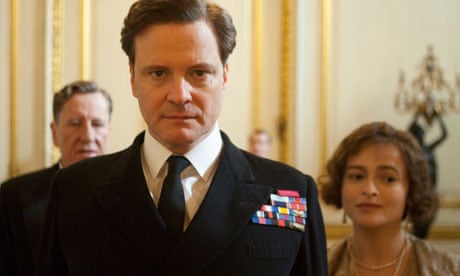
The King's Speech – review
S ome films are known as "game-changers". This is not one of those films. It is a don't-change-the-game-er, or yet a jolly-well-change-it-back-er: a traditionally mounted, handsomely furnished British period movie, available at a cinema near you in dead-level 2D. Set in the 1920s and 30s, it is populated by that sort of well-suited patrician Englishman of yesteryear who drinks spirits in the middle of the day, whose middle and index fingers are rarely to be seen without an elegant cigarette interposed, and who pronounces the word "promise" as "plwomise" (try it).
Written by David Seidler and directed by Tom Hooper, The King's Speech is a richly enjoyable, instantly absorbing true-life drama about the morganatic bromance between introverted stammerer King George VI and his exuberant Australian speech therapist Lionel Logue: an affair brokered by George's shrewd wife in her pre-Queen-Mum incarnations as the Duchess of York, and then Queen Elizabeth. These characters are performed with pure theatrical gusto by Colin Firth as the miserably afflicted monarch, Geoffrey Rush as the twinkly eyed speech coach and Helena Bonham Carter as the Queen who has to learn to like Logue by overcoming her own snobbery – which she incidentally never troubles to disguise as shyness.
As well as this, the movie is an intriguing, if slightly loaded new perspective on the abdication crisis of 1936. Above all, it's a smart anti-Pygmalion. Like Shaw's Eliza Doolittle, the poor King as a younger man is forced to speak with his mouth full of marbles, and comes close to Eliza's fate of swallowing one.
But where she had to smarten up and talk proper, George VI (formerly the Duke of York, always known as "Bertie") has to move in the other direction: he has to loosen up, be less formal, less clenched, less clinically depressed. The movie cleverly casts a new light on the dysfunctional tremor at the heart of Britain's royal family, and cheekily suggests there was a time when a British monarch experimented with psychoanalysis, disguised as speech therapy.
Firth's face is a picture of misery in the opening scene, under his top hat, as if attending his own funeral. It is his first public appearance, required to speak through a microphone to vast crowds at the empire exhibition at Wembley stadium, and via live radio to the nation. His stammer means he can hardly get a word out, and the nation cringes with embarrassment. His formidable father, played by Michael Gambon with England's gruffest beard, makes clear to him that this is a new media age. It's not just a matter of looking frightfully regal on a horse, the monarch has to be able to master the radio microphone. Spectacle must not be replaced by dead air.
This is where Lionel Logue comes in – a bullish Australian with bohemian manners and shabby premises on Harley Street. He is a failed actor who is everywhere patronised as a colonial, especially by the toffee-nosed English theatrical types for whom he still hopefully auditions. We see him trying out for an amateur company by doing Richard III's "winter of our discontent" soliloquy. (Might Hooper and Seidler have considered making Logue do the "popinjay" speech by Hotspur from Henry IV Part One – the Shakespeare character traditionally played as a stammerer? Too obvious?) In his script, Seidler creates sharp exchanges as Logue fearlessly barges through the pompous royal formality that's all part of the problem, cheerfully deriding his previous medical advisers: "They're all idiots!" "They've been knighted!" splutters Bertie. "Makes it official then, doesn't it?" Slowly, Bertie opens up to his new friend about his unhappy childhood, and doesn't notice how his speech is improving.
The crisis comes when Logue gets too close to his patient, and Rush shows how "red carpet fever" is getting the better of him: he even affects some anti-colonial hauteur in dismissing the ambitions of Edward's mistress, Mrs Simpson, scoffing at the idea of "Queen Wallis of Baltimore".
Meanwhile, the abdication means poor, stuttering Bertie has to shoulder the ultimate burden while "Herr Hitler" is whipping up the stormclouds of war. The nation needs a king who can rally the forces of good in a clear, inspiring voice. Are Bertie and Lionel up to the job?
As well as the three leads, there are two tremendous supporting turns: Guy Pearce is a terrific Edward, the smooth, obnoxious bully who mocks Bertie's stammer and, marooned in Sandringham, yearns for phone sex with Mrs Simpson – what he ickily calls "making our own drowsies". Gambon has two great scenes as George V: first as the robust patriarch, barking orders at his quailing son, and then – the sudden decline is a modest coup du cinéma – incapable and on the verge of dementia, mumbling and maundering as his privy councillors make him sign away his executive responsibility.
Not everyone's going to like this film: some may find it excessively royalist and may, understandably, feel that it skates rather too tactfully over Bertie and Elizabeth's initial enthusiasm for appeasement and Neville Chamberlain. In this version, Chamberlain hardly features at all – we appear to pass directly from Stanley Baldwin's resignation to the sudden appearance of First Lord of the Admiralty Winston Churchill, jowl-quiveringly, sinew-stiffeningly played by Timothy Spall – always giving advice and apparently permitted to wield a lit cigar in the sovereign's presence. But The King's Speech proves there's fizzing life in old-school British period dramas – it's acted and directed with such sweep, verve, darting lightness. George VI's talking cure is gripping.
- Colin Firth
- Helena Bonham Carter
- Drama films
- Period and historical films
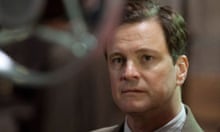
The King's Speech flies the flag for a stiff upper lip that no longer exists
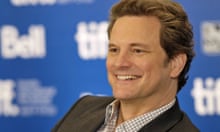
The King's Speech: an emotionally stirring Oscar magnet
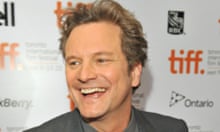
The King's Speech rules Toronto film festival

Could Colin Firth's King's Speech become one of Oscar acceptance?
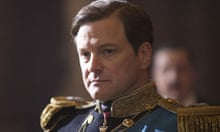
The King's Speech – review
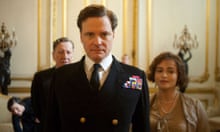
Colin Firth has left his posh acting peers in the dust. Give him the Oscar for The King's Speech now
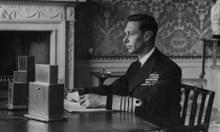
The King's Speech: How George VI's simple domesticity made him the king his country needed in time of war
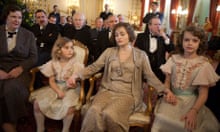
The King's Speech: How clever sets create a compelling picture of 1930s London
Comments (…), most viewed.
We use cookies to enhance our website for you. Proceed if you agree to this policy or learn more about it.
- Essay Database >
- Essay Examples >
- Essays Topics >
- Essay on Psychology
Essay On The King’s Speech: A Story Behind The Movie
Type of paper: Essay
Topic: Psychology , Cinema , Relationships , Rhetoric , Family , Parents , Treatment , Speech
Published: 02/10/2020
ORDER PAPER LIKE THIS
The King’s Speech is a film that has won accolades across the globe for its quintessential portraiture of British history and the struggle of King George VI, played by Colin Firth, to overcome his stammering. The film delves deep into the process of overcome the impediments of speech with the exploration of the relationship between the king and Lionel. King George VI was never expected to ascend the throne. He suffered from a severe stammer and this made him unable to speak in public. It is his father, King George V advised him to learn to overcome his difficulty, Prince Albert started training to speak well. After he failed to overcome the problem through conventional means, his spouse, Elizabeth, sought the aid of Lionel Logue, a therapist. Prince Albert had become the king of the nation after King Edward VIII, his elder sibling, abdicated the throne to get married to a divorcee. Now, King George VI was required to give a speech addressing the innumerable citizens of the nation as World War II was on the horizon. The king’s therapist took to his notice the fact that Albert did not stutter when he swore and then used this insight to progress in the therapeutic treatment of the king. While both the king and his wife wished the therapist to focus on the physical exercises, Logue taught him how to relax his muscles and control the breath through specific techniques. However, Logue also continued to gently probe into the latent psychological roots of the problem. Albert was initially very embarrassed. But, he opened up to the therapist and revealed many of the pressures of childhood. He had a very tense relationship with his father who was extremely strict. He repressed his left-handedness which was natural to him. There were metal splints which were used to correct his knock-knees. The king was also physically abused by his nanny and he was left scarred by the demise of Prince John, his younger brother. While the two individuals became friends in the course of the treatment, Logue addressed the psychological causes too to help the king overcome the difficulty. Thus, the king could finally get the better of this impediment and deliver the speech with passion and conviction.

Cite this page
Share with friends using:
Removal Request

Finished papers: 1522
This paper is created by writer with
ID 262649005
If you want your paper to be:
Well-researched, fact-checked, and accurate
Original, fresh, based on current data
Eloquently written and immaculately formatted
275 words = 1 page double-spaced

Get your papers done by pros!
Other Pages
The politics of malaysian idol on culture and politics in postcolonial malaysia article review, free essay on environmental studies 2, good research paper about female genital mutilation and its consequences, research paper on organizational structure of wal mart stores inc, what is really real argumentative essay, tariffs benefits and costs essays example, good essay on environment scan, free essay on we can but dare we, deforestation research paper, current issues affecting labor relations and collective bargaining essay example, free essay about ajax minerals and perrier, new class essay examples, a level term paper on macys omni channel analysis for free use, example of cost management essay, good globalization and politics question answer example, our buggy moral code essay samples, free laser ablation inductively coupled plasma mass spectrometry report top quality sample to follow, exploration essay samples, free media question answer top quality sample to follow, administering essays, firing essays, mullin essays, clubs essays, miners essays, gold rush essays, political and economic essays, bryan essays, rumors essays, boney essays, merchants essays, fritzsche essays, ethical theories essays, moral theory essays, self ignorance essays, the kingdom of god essays, disraeli essays, wedding day essays, dunedin essays, teaser essays, geller essays, brookhaven essays, princess of wales essays, chenoweth essays.
Password recovery email has been sent to [email protected]
Use your new password to log in
You are not register!
By clicking Register, you agree to our Terms of Service and that you have read our Privacy Policy .
Now you can download documents directly to your device!
Check your email! An email with your password has already been sent to you! Now you can download documents directly to your device.
or Use the QR code to Save this Paper to Your Phone
The sample is NOT original!
Short on a deadline?
Don't waste time. Get help with 11% off using code - GETWOWED
No, thanks! I'm fine with missing my deadline
Academia.edu no longer supports Internet Explorer.
To browse Academia.edu and the wider internet faster and more securely, please take a few seconds to upgrade your browser .
Enter the email address you signed up with and we'll email you a reset link.
- We're Hiring!
- Help Center

The King's Speech, movie review

Related Papers
Robert Kaplan
A Companion to the Biopic
Alexa Alice Joubin
“Can you hear me?” asks Stephen Hawking towards the end of The Theory of Everything. Slumping in a motorized wheelchair, theoretical physicist Hawking (Eddie Redmayne) poses the question in a monotonic, computer-generated voice with staccato quality to an eager audience through his speech synthesizer. Even though he is physically present, his disembodied voice fills the auditorium in ways that suggest both his earth-bound reality and transcendental status. The question “can you hear me” is a profound moment that invites various levels of interpretation. On a literal level it is a quotidian question about legibility and whether the speaker is audible, but it bears symbolic significance at the end of this film, which generates consensual pleasure. On a philosophical level, it asks both the audiences within and outside the film’s universe whether they understand him after following the biopic subject around in his wheelchair through his tribulations and triumphs. On a metacinematic level, it asks whether the biopic as a redemptive genre merely speaks for its subject or allows Hawking to speak for himself. Perhaps a more urgent question for adaptation studies is whether the biopic subject can speak and be truly heard. Two recent biopics, The King's Speech (dir. Tom Hooper, 2010) and The Theory of Everything (dir. James Marsh, 2015), seek to give a voice to their historical and contemporary subjects who could only speak in disembodied voices. The films navigate the fine lines between public disgust of voice disability and the craving for what might be called “supercrip” figures—figures who are defined by their physical limitations but who, because of their disability, are perceived as possessing extraordinary talents and abilities. The adaptations of King George VI's and Stephen Hawking's life stories show their uneasy relationship to the "troubled-white-male-genius" genre and to the vocal embodiment of their subjects who lose and gain a voice through therapy, technology, and their will to live a full life. The films carefully skirt the edges of public disgust and pity of differently abled bodies: how the stuttering King George VI struggles to find his voice and adapt to the then emerging and increasingly important radio broadcasting technology; and how the physicist Stephen Hawking speaks through a speech synthesizer.
It Takes More than Public Speaking: A Leadership Analysis of The King’s Speech
Brandon O Hensley, Ph.D.
In a time of global anxiety, a recent internationally acclaimed film aptly shows the development of a leader who never intended to lead. This leadership analysis of The King's Speech critically explores transformation shaped by the pressures of war, modernity, and a public figure's speech impediment in the advent of radio broadcasting. Supportive leadership and followership are examined, as the Duchess of York serves as an exemplar of both. The central catalyst of transformative leadership comes from Lionel Logue, who exercises his role with emotional intelligence and key strategies that are invaluable to the eventual King finding his voice. The servant leadership role is discussed, as it resonates strongly with an ongoing need for transformative and shrewd servant leaders in an increasingly fragmented and information- based global economy.
Robin S Stewart
Presented at 43rd Annual Popular Culture Association / American Culture Association National Conference. March 2013. Washington, D.C.
Masters Thesis
Ognjen Škundrić
The aim of this thesis is to use acoustic and auditory phonemics as tools for speech analysis. Since there are only a few people in Serbia who deal with phonemics as a linguistic discipline, the author made the effort and this his duty to contribute to this vaguely broached topic by asking the following questions-how does the phonemic stratum reflect within the language we speak? In other words, the very purpose on the whichthe thesis is based developed academic disciplines is the acoustic investigation of the concept of voice. Furthermore, the second purpose is one which stretches across the entire globe, since the author wanted to have a perspective of the properties of a speech which was heard by a majority of the world's population. The pre-war speech which King George VI delivered was crucial, mostly, in the sense of preparing the aforesaid population for war. The author used the speech software Praat, version 6.1 to acoustically compare the voices of people who had been born in the Victorian epoch and spent the majority of their lives living and speaking in a Post-Victorian manner, everyone except the actor Colin Firth. Namely, those people are- King George VI, Sir Bertrand Russel, Virginia Woolf and the aforesaid Colin Firth. The thesis is a detailed piece of written work biographically and empirically sound, based on the theory of speech perception and acoustic and auditory phonemics, where the former theory is part of the latter discipline. Spectrograms and images of formants were used to compare the variations between the main two voices of the thesis, those of, The King and the actor who portrayed him in the movie The Kings Speech. Keywords: phonemics, speech perception, movie, King George VI, Colin Firth, Praat speech software, acoustics, formants.
Postcolonial Studies
Nishant Shahani
(PDF Edition)
Dr Ed Owens
https://www.history.ac.uk/publications/ihr-books-series/new-historical-perspectives/family-firm-monarchy-media-and-british-public-1932-53 The Family Firm presents the first major analysis of the public projection and reception of the British monarchy’s media image in the period 1932-1953. Beginning with King George V’s first Christmas broadcast in 1932, the royal household worked with the Church of England and the media to initiate a new phase in the House of Windsor’s public relations strategy. Together they elevated the royal family’s domesticity as a focal point for popular identification and this strengthened the emotional connections that members of the public forged with royalty. The Family Firm shows how the tightening of these bonds had a unifying effect on British national life in the unstable years during and either side of the Second World War and helped to restore public confidence in a Crown that was profoundly shaken by the 1936 Abdication Crisis.
Open Journal of Modern Linguistics, 4(2), 350-66
Starling D Hunter
This paper describes a novel method of network text analysis, one that involves a new approach to 1) the selection of words from a text, 2) the aggregation of those words into higher-order concepts, 3) the kind of the relationship that establishes statements from pairs of concepts and 4) the extraction of meaning from the text network formed by these statements. After describing the method, I apply it to a sample of the seven most recent winners of the Academy Award for Best Original Screenplay―Little Miss Sunshine, Juno, Milk, The Hurt Locker, The King’s Speech, Midnight in Paris, and Django Unchained. Consistent with prior research, I demonstrate that structure encodes meaning. Specifically, it is shown that statements associated with a text network’s least constrained nodes are consistent with themes in the films’ synopses found on Wikipedia, the International Movie Database, and Rotten Tomatoes.
John Richardson
Elizabeth Britannia
RELATED PAPERS
CSO Surabaya
Mary Marchioness of Downshire and Baroness Sandys, 1764-1836, part 2
Martin Davis
Theatre Journal
Rebecca Lemon
yobi yusdita
Handbook of Clinical Neurology
Ahmed Qureshi
Translating and Interpreting Conflict, MYRIAM SALAMA-CARR (ed.)
Paschalis Nikolaou
American, British and Canadian Studies Journal
Ioan Serban
Master of Art's Thesis in Thai Studies, Faculty of Arts, Chulalongkorn University
Frederick Goss
erim kutsal
Masonic Rivalries and Literary Politics: From Jonathan Swift to Henry Fielding
marsha schuchard
dea kipshidze
Revue Internationale de Philosophie
Peter Murphy
ilyes Meghlaoui
Mary Marchioness of Downshire and Baroness Sandys, 1764-1836 part 1
Eva Mantzourani
Valerie Estelle Frankel
RELATED TOPICS
- We're Hiring!
- Help Center
- Find new research papers in:
- Health Sciences
- Earth Sciences
- Cognitive Science
- Mathematics
- Computer Science
- Academia ©2024
The King's Speech

56 pages • 1 hour read
A modern alternative to SparkNotes and CliffsNotes, SuperSummary offers high-quality Study Guides with detailed chapter summaries and analysis of major themes, characters, and more.
Chapter Summaries & Analyses
Chapters 1-3
Chapters 4-6
Chapters 7-9
Chapters 10-12
Chapters 13-16
Key Figures
Symbols & Motifs
Important Quotes
Essay Topics
Discussion Questions
King Edward VIII has perhaps the biggest influence on the life of his brother. His abdication sets the stage for an unexpected figure to step into the unwanted role as King. In what ways could Edward be considered the book’s most villainous character?
There are many father/son relationships throughout the text. Which one results in the strongest bond between father and son?
In what ways does The King’s Speech challenge traditional notions of class in Great Britain?

Don't Miss Out!
Access Study Guide Now
Featured Collections
British Literature
View Collection
Inspiring Biographies

IMAGES
VIDEO
COMMENTS
Exclusively available on IvyPanda. The film, The King's Speech (Hooper) is a story filled with intricate anti-stereotypic images and paradigm shifts within a larger plot of the British royal family. It is set in the period when Britain went to war with Germany. Albert, the Duke of York, who will later inherit the throne as King George VI, has ...
The King's Speech: A Rhetorical Analysis. Anyone that has seen the 2010 film The King's Speech knows of the numerous circumstances preceding King George VI's delivery of his first wartime broadcast. Above all, they know of his personal anxiety surrounding his usurping of the throne and speech impediment; however, this sample of historical ...
How historically accurate is the movie The King's Speech. Firth as George VI and Bonham-Carter as his wife Queen Elizabeth. In 2010, The King's Speech won the Oscar for Best Picture and grossed over $414 million worldwide. It was an unlikely box office champion because it was based on a true story about King George VI of Britain (1895-1952 ...
The King's Speech Film Analysis. The King's speech is a historical drama film featuring King George the Sixth who copes with a stammer. The movie depicts historical events during the 1930s in London. Among the main characters are, King George VI who is also addressed by 'Bertie' by his close family members, Elizabeth, Lionel Logue as well ...
Review: The King's Speech. By Scott Foundas in the November-December 2010 Issue. "In the past, all a king had to do was look good in uniform," observes King George V (Michael Gambon)—the first British monarch to address his subjects via radio—early on in Tom Hooper's splendid period drama The King's Speech. "Now we must invade ...
The King's Speech. A tale of friendship, transformation, and royalty's quest for equality. An uplifting and warm-hearted character study that owes as much of its delight to a charming performance by Geoffrey Rush as it does to a structure built upon depicting a Change Main Character who grows out of seemingly insurmountable odds to overcome his personal issues.
The King's Speech. Inciting Event: Watching Bertie, the Duke of York, go through another ineffective and humiliating "treatment" for his stammer with another respected doctor. Bertie's wife Elizabeth gets the name of Lionel Logue, a speech therapist, and visits him to see if he can help her husband. First Plot Point: After a disastrous ...
The King's Speech Analytical Essay. God Save The King's Speech Academy award winning film, The King's Speech, is a motivational movie where voice and courage become a matter of life and death. Prince Albert, later known as King George VI (Colin Firth), stammers excessively and uncontrollably through his inaugural speech closing the 1925 ...
The King's Speech is a 2010 historical drama film directed by Tom Hooper and written by David Seidler. Colin Firth plays the future King George VI who, to cope with a stammer, sees Lionel Logue, an Australian speech and language therapist played by Geoffrey Rush.The men become friends as they work together, and after his brother abdicates the throne, the new king relies on Logue to help him ...
"The King's Speech" tells the story of a man compelled to speak to the world with a stammer. It must be painful enough for one who stammers to speak to another person. To face a radio microphone and know the British Empire is listening must be terrifying. At the time of the speech mentioned in this title, a quarter of the Earth's population was in the Empire, and of course much of North ...
The King's Speech: How George VI's simple domesticity made him the king his country needed in time of war 2 Jan 2011 The King's Speech: How clever sets create a compelling picture of 1930s London
The King Speech Analysis. 849 Words4 Pages. The King's speech is a movie which resonates during 1930s London where Prince Albert face difficulty in speaking in public due to his stammer. Frustrated about his conditions, he seeks help from multiple speech therapists in hope to cure his stammer. None of them worked till his wife, Elizabeth who ...
Published: 02/10/2020. The King's Speech is a film that has won accolades across the globe for its quintessential portraiture of British history and the struggle of King George VI, played by Colin Firth, to overcome his stammering. The film delves deep into the process of overcome the impediments of speech with the exploration of the ...
In a time of global anxiety, a recent internationally acclaimed film aptly shows the development of a leader who never intended to lead. This leadership analysis of The King's Speech critically explores transformation shaped by the pressures of war, modernity, and a public figure's speech impediment in the advent of radio broadcasting ...
The King's Speech Analysis. 1586 Words7 Pages. The film The King's Speech is directed by Tom Hoper. The film is the confidential story of a famous public man, King George VI (he is known as Bertie in his family circle) the woman who loved him and became his queen, and the ingenious Australian speech therapist Lionel Logue, who helped him ...
The King's Speech is a 2010 non-fiction book about King George VI and how he was treated for a speech impediment by the Australian Lionel Logue.Their unlikely friendship is credited for saving the British monarchy during a difficult time in world history. The King's Speech was co-authored by Mark Logue (grandson of Lionel Logue) and Peter Conradi (an accomplished author of historical ...
The Duke's. rigidity of behavior and thinking is challenged by Mr. Logue requests. Mr. Logue makes him roll. on a carpet, lift his wife using his diaphragm, jump, shake and more."Anyone who can ...
To protect the anonymity of contributors, we've removed their names and personal information from the essays. When citing an essay from our library, you can use "Kibin" as the author. Kibin does not guarantee the accuracy, timeliness, or completeness of the essays in the library; essay content should not be construed as advice.
Thanks for exploring this SuperSummary Study Guide of "The King's Speech" by Mark Logue , Peter Conradi . A modern alternative to SparkNotes and CliffsNotes, SuperSummary offers high-quality Study Guides with detailed chapter summaries and analysis of major themes, characters, and more.